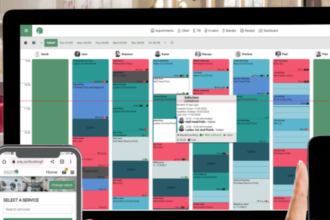Technology is having a big impact on every aspect of our lives, and healthcare is no exception. In this article, we will take a closer look at how technology is transforming the healthcare industry. We will discuss the importance of electronic health records, personalized treatment, telehealth, surgical technology, artificial technology and augmented reality. These technologies are making it possible for patients to receive more personalized care, and they are also helping to improve efficiency and accuracy in the healthcare industry.
Electronic health records
Electronic health records are one of the most important technologies in healthcare. What makes it so important? Electronic health records allow healthcare providers to have a complete view of the patient’s medical history of all the care they have received, from any location. This helps to ensure that patients receive the best possible care and avoid duplicating tests. This not only helps to improve the quality of care that patients receive, but it also helps to reduce costs and improve efficiency. Also, electronic health records make it easier for patients to share their medical information with healthcare providers. It makes it possible for patients to see their medical records, and it also allows them to authorize other healthcare providers to access their information. It is estimated that the use of electronic health records can save the healthcare industry billions of dollars each year.
Personalized treatment
Like every service or product, the healthcare industry is becoming more and more personalized. Personalized treatment is another important trend in healthcare. Like electronic health records, it is becoming increasingly important as we move towards a more individualized approach to healthcare. With personalized treatment, doctors are able to tailor treatments specifically for each patient based on their individual needs and preferences. It makes use of technology to help healthcare providers better understand the individual needs of each patient. This includes using information such as genomics, proteomics, and pharmacogenomics to create customized treatment plans for patients. Personalized treatment can improve outcomes for patients and also helps to reduce costs. As seen with digital health companies, personalized treatment is accessible to everyone. This helps massively when it comes to complex diseases such as cancer, where patients can receive treatments that are specifically tailored to their own individual needs. A truly personalized approach to healthcare is only possible with the help of technology. It is one of the most important trends in healthcare today.
Telehealth
Telehealth is another area where technology is having a big impact. It is an area that is growing rapidly, and it is estimated that the market for telehealth services will reach $36 billion by 2020. Nowadays, it is possible for patients to connect with healthcare providers without having to leave their homes. This type of care allows patients to receive care from a distance. It makes use of technology such as video conferencing, email, and the internet to provide care. This type of care is becoming increasingly important as more and more people live in rural areas or are unable to travel to see a healthcare provider. Telehealth can also be used to provide specialist care to patients who would otherwise have difficulty accessing it. Also, it can help to reduce the cost of healthcare by allowing patients to receive care from home. Sometimes, telehealth can be used to provide care to patients in other countries. A truly global healthcare system is only possible with the help of technology. Think about how difficult it would be to provide care to a patient in another country without the use of technology. What used to be a bank-breaking challenge is now an easily manageable task.
Surgical technology
Surgical technology is another area where healthcare is benefiting from advances in technology. Not only are new and improved surgical techniques being developed, but technology is also helping to make surgery safer. One example of this is the use of robotics in surgery. Robotics can help to improve the accuracy of surgery and also reduce the risk of complications. This type of technology is making it possible for more complex surgeries to be performed safely. It is also helping to reduce the length of hospital stays and the need for rehabilitation after surgery. It makes it possible for patients to get back to their lives sooner. Think about how amazing it is that technology can help to make surgery safer. It is one of the most important advances in healthcare today.
Artificial technology & augmented reality
Artificial technology and augmented reality are two other areas where healthcare is benefiting from advances in technology. They are closely related, and both are having a big impact on healthcare. These technologies are being used to create simulations of medical procedures. They combine the real world with virtual worlds to create an immersive experience.
This type of technology can be used to train healthcare providers and also help patients understand complex procedures. It can also be used to provide information about diseases and treatments. This is like a new-age revolution in the healthcare industry, where every passing day brings with itself new challenges in treatment and diagnosis. And, with the implementation of Augmented Reality in healthcare, it is becoming easier for doctors in finding the most effective cure for a patient through the most accurate diagnosis method of his/her symptoms that a patient narrates.

Technology is having a big impact on healthcare, and it is changing the way that doctors and patients interact. With the help of technology, we are able to provide more personalized care, and we are also able to improve efficiency in the healthcare industry. These advances are making it possible for us to provide better care for our patients, and they are also helping to improve the overall quality of healthcare.
Useful? Why?
Technology is useful in Healthcare because it helps to create a more efficient work environment for both Doctors and Patients. It also allows for more personalized care, which can help to improve patient outcomes. Additionally, technology can help to make procedures less invasive and more comfortable for patients.














